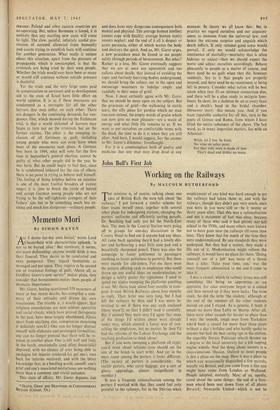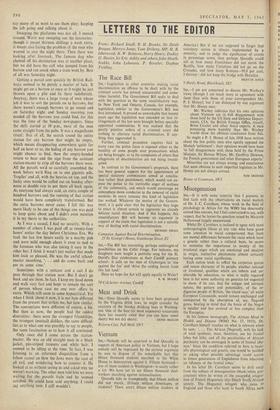John Bull's First Job
Working on the Railways
By MALCOLM RVTHERFORD
rTIHE minister is, Of course, talking about one I idea of British Rail; the men talk about 'the railways.' I put forward a similar scheme for liner trains myself once, together with several other plans for redesigning stations, changing the porters' uniforms and efficiently sorting parcels. Dr. Beeching had only just hit the North-East then. The men in the Central Station were going off in groups for one-day discussions in the COunty Hotel to find out if anyone had any ideas. All came back agreeing they'd had a lovely din- ner and harbouring a neat little note pad and a beautifully sharpened pencil. There was also the campaign to foster politeness to passengers (nothing to foster politeness to porters). But these were mainly for old-timers. For me there were the posters offering cash to employees who could throw up any useful ideas on modernisation, or design a safety poster for signalmen. I used to spend my nights sweeping the platforms puzzling it out. My thesis took about four months to com- pose. It took British Railways about four months to reply. Their letter was very long, but 1 had left the railikays by then and I was more in- terested to see if there was any cash enclosed (there wasn't), so that I didn't read it carefully. But it seemed they were sure I'd agree that most of the things I'd' written about were already under way, which seemed a funny way of con- sulting the employees, but no matter, by then I'd had the reforms of the Labour Exchange and the teaching profession to think about.
But if you• were sweeping a platform all night, you'd think about reforms (you should see the size of the brush to start with). And yet in the mess room among the porters it looks different. (The variety of porters is considerable: the visible porters, who carry luggage, are a sort of glossy appendage, almost insignificant in number.)
It was a frequent rationalisation among the porters I worked with that they could feel only grateful to the railways, for in the Thirties when
employment of any kind was hard enough to 'get the railways had taken them in, and with the railways, though they didn't pay very much, once you were in you were still' in—be it twenty or thirty years after. That this was a rationalisation and not a statement of fact was clear, because many of those who said it had plainly not left school in the 1930s, and many others were known not to have gone near the railways till some time later. They knew that for much of the time they were underemployed. By any standards they were underpaid. But they had a system, they made a life out of it. Modernisation might reform the railways; it would have no place for• them. 'Doing yourself out of a job' was more of a •threat than a joke. 'Take ybur time, son,' was the most frequent admonition to Me and -I came to take it.
I was a casual, which in railway terms was still something like being an apprentice or • on approval, for once everyone began as a casual and then moved up if they were lucky. The term stuck. So did the term 'the student,' although at the end of the summer all the other students moved on and I stayed. As a generic, I think it meant no more than Lofty or Shorty. After all, there were other casuals far harder to place than I was; the smooth, tough man from Yorkshire who'd been a casual for more than three years without a day's holiday and who hardly spoke to anyone but had the best racing tips in the station, the superbly literate Pakistani who'd thrown up a degree at the local university for a job tapping engine wheels. And the thing about accents is a class-conscious illusion. Oxford to most people is just a place on the map. Here it was a place to which you occasionally dispatched a few parcels, usually via Bristol, and you came from it like you might have come from London or Wallsend. People adapted, mutually. Most of us, openly, cared about the same things: the sod of a fore- man who'd been sent down from of all places Berwick; Newcastle United—which is not to
say many of us went to see them play; keeping the job going and talking about it.
Sweeping the platforms was not all. I moved around. Worst was sweeping out the lavatories: though it meant thirteen shillings a week extra, it meant also facing the problem of the men who wanted to stay the night there. Then there was looking after livestock. The famous dog who chewed off his destination was at another place, but we did have the calf who jumped from his barrow and ran amok when a train went by. Best of all was Saturday night.
Getting a parcel sent quickly by British Rail- ways seemed to be purely a matter of luck. It
might get on a barrow at once or it might be just thrown upon a pile and lie there indefinitely. Anyway, there was a large troop of men whose job it was to sort the parcels on to barrows, but there weren't enough barrows to go round and on Saturday night and Sunday morning. you needed all the barrows you could find, for this was the time of the Sunday newspapers. Since the shift started at 10 p.m., most of the men came straight from the pubs. It was a magnificent ritual: first of. all, the search round the entire station for any barrow that might be empty, which meant disappearing somewhere quiet for half an hour or so, the hiding of any barrow you might chance to find, then the• empty-handed return to base and the sign from the assistant station-master to strip all the barrows there were. All the parcels we'd so carefully assembled the week before we'd fling on to one gigantic pile, 'fragiles' and all, with the heavies on top, and the lucky ones would be called out on Sunday after- noon at double rate to put them all back again. As everyone had always said, an extra couple of hundred barrows and the'running of that station would have been completely transformed. But the extra barrows never came. I felt this was more likely to be one of the things one was paid to keep quiet about and I didn't even mention it in my thesis to the authorities.
As I was a casual, I had no security. With a number of others I was paid off at twenty-four hours' notice the day before Christmas Eve. We took the last few hours easily in a nearby pub and were mild enough about it even to nod to the foreman who was also taking it easy in the other bar. I think it wasn't just malice that made him look so pleased. He was the awful school- master mouthing, `. . . and do come back and• see us some time.'
Sometimes with a suitcase and a suit I do pass through that station now. But -I don't go back and see them. In fact, I keep my head down and walk very fast and hope to remain the sort of person whose case no one ever offers to carry. Which will seem to some hypocritical. Yet when I think about it now, it is not how different from the present that strikes me, but how similar. The conventions were different of course, a bit. But then as now, the people had the oddest diversities: there were the strangest friendships, the strongest (mutual) dislikes, the same difficul- ties as to what one was possibly to say to people, the same fascination as to how it all continued.
Only once did I come across the station- master. He was an old straight man in a black jacket, pin-striped trousers and white hair. I seemed to be idling at the time. In fact, I was listening to an informed disquisition from a fellow casual on hbw the Jews were the root of all evil, and wondering how to counter it. He looked at us without seeing us and asked why we weren't working. The other man told him we were waiting for the parcels train and he seemed satisfied. He could have said anything. I could say anything now. I still wouldn't.



































 Previous page
Previous page